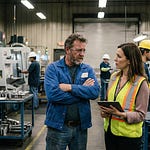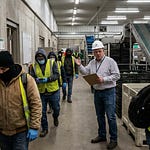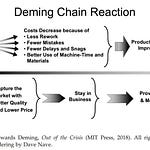Imagine you’re running a business that’s always in motion. New marketing ideas, process changes, team initiatives — all in the name of improvement. But deep down, you feel like you’re guessing. Some efforts work beautifully, others fizzle, and you can’t quite explain why. You’re getting results, but not understanding.
That’s where W. Edwards Deming’s Theory of Knowledge comes in. It’s the part of his System of Profound Knowledge that deals with how we learn, not just how we act. Deming believed that experience alone doesn’t teach us much — unless we start with a theory that predicts what will happen. As he famously said, “Experience by itself teaches nothing. Without theory, there is no learning.”
Experience by itself teaches nothing. Without theory, there is no learning. — W. Edwards Deming
The problem: Acting without understanding
Consider Sarah, an operations manager in a mid-sized manufacturing company. She’s bright, dedicated, and deeply frustrated. “We keep launching improvement projects,” she tells her team, “But I can’t tell what’s actually making the difference.”
Across the table, Leo, one of her front-line employees, nods. “Every few months, there’s a new initiative,” he says. “We collect data, we make changes, but honestly — we’re just guessing.”
Sarah and Leo’s situation is common. They’re reacting to results rather than understanding the system that produces them. Without a theory — without an explanation of cause and effect — every improvement becomes an isolated experiment. Something works? Great. But why did it work? Will it still work next quarter? In another department? Under different conditions? They have no way to know.
Deming captured this idea simply: “Management is prediction.” In other words, every decision a manager makes is, at its core, a prediction about the future — an expression of belief that if we do this, then that will happen. To make sound predictions, we need theory first.
Management is prediction. — W. Edwards Deming
The turn: From guessing to learning
Sarah decided to try something different. At the start of her next improvement project, she asked her team a simple question: “Before we make this change, what’s our theory? Why do we think this will help?”
The room went quiet. Then Leo spoke up. “We think if we shorten our daily huddles from twenty minutes to ten, we’ll have more time to solve problems on the floor — without losing communication quality.”
That statement was their theory — a small, testable prediction connecting cause (shorter meetings) to effect (more time for problem-solving). For the first time, they weren’t just changing things; they were learning.
After a month, they measured the results. Productivity had improved, but only when team leads posted a short, written summary after each huddle. Without that follow-up, communication gaps reappeared. So, they revised their theory: the improvement came not from shorter meetings alone, but from pairing brevity with written follow-through.
In that moment, Sarah’s team crossed an invisible line. They stopped being operators of a process and became students of it. They were no longer guessing — they were learning through prediction and revision. That is Deming’s Theory of Knowledge in action.
What this means for you
In business, it’s easy to confuse action with progress. We change processes, restructure teams, and roll out new strategies — but unless we understand why those changes work, we’re just rearranging pieces on the board. The Theory of Knowledge reminds us that improvement without theory is luck; improvement with theory is learning. It’s the difference between reacting to outcomes and building a body of understanding that compounds over time. Deming urged managers to ground every action in prediction and reflection. When our predictions fail, it isn’t a setback — it’s feedback. The theory was wrong, and that’s valuable information. As Deming put it, “Knowledge comes from theory. Without theory, there is no learning.”
Knowledge comes from theory. Without theory, there is no learning. — W. Edwards Deming
Actionable takeaways
Start every improvement with a theory. Before making a change, write down what you believe will happen and why. This creates a baseline for learning.
Make predictions explicit. Treat every initiative as a hypothesis: If we do X, then Y should happen because...
Compare results to your predictions. When outcomes differ, don’t blame the data or the people — revisit your theory. What did you misunderstand about the system?
Document what you learn. Keep a “theory log” — a living record of your team’s experiments and evolving understanding. Over time, this becomes your most powerful management asset.
Value learning over being right. Progress comes from refining your understanding, not from defending your initial ideas.
Sarah’s story ends simply. Her team didn’t just fix a meeting problem — they learned how to think. They moved from reacting to results to developing knowledge about why results occur.
That’s the quiet power of Deming’s Theory of Knowledge: it replaces the illusion of control with the practice of learning. When managers lead with theory — when they predict, test, and revise — they stop chasing outcomes and start compounding understanding. And in business, understanding is the only sustainable competitive advantage.













